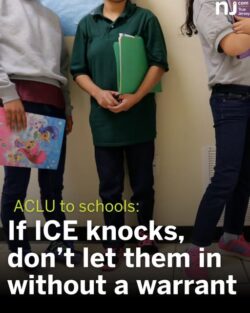
The American Civil Liberties Union of New Jersey and a pair of immigrant and children’s rights groups have sent a letter to New Jersey‘s 600-plus school districts and charter networks advising them not to let ICE agents into buildings or onto school property without a judicial warrant signed by a state or federal judge or magistrate.
The groups said the letter was in response to an executive order signed by President Donald Trump rescinding a policy that had declared schools and churches off-limits to agents of U.S. Immigration and Customs Enforcement, as ICE is formally known, and its sister agency, U.S. Customs and Border Protection.
The letter was sent out jointly this week by the Jersey City-based New Jersey Consortium for Immigrant Children, the ACLU-NJ, and the Education Law Center, both based in Newark.
“Public school administrators have the duty to educate all students, and the power and responsibility under the U.S. Constitution and state law to protect the rights of their students,” read a statement from ACLU-NJ Executive Director Amol Sinha.
“New Jersey schools have an obligation to ensure that all students feel welcome, regardless of immigration status, and no matter who is in the White House.”
The letter includes references to the New Jersey and U.S. constitutions, the federal Family Educational Rights and Privacy Act of 1974, the U.S. Supreme Court’s Plyler v. Doe decision in 1982, and other legal precedents and statutes, granting the same benefits and protections to immigrant students, documented or otherwise, as those of their citizen classmates.
ICE did not respond to a request for a comment on the letter on Wednesday.
The letter also instructs districts of their restrictions and obligations regarding immigrant children.
For example, it says districts cannot make immigration status a condition of enrollment or even keep a student’s immigration status on file, except in cases involving Title III of the Elementary and Secondary Education Act, which provides federal funding for English language instruction.
The letter urged school officials to demand that enforcement agents produce a judicial warrant signed by a state or federal judge or magistrate.
Even then, the groups urged principals or other officials to ask their superintendent and district lawyer to review the warrant to ensure it’s properly filled out and signed and is being used to search only the address specified or arrest only individuals identified by name.
The letter advises districts that ICE agents may try to enter a protected location by presenting an administrative “warrant,” a departmental document that, despite its name, lacks the authority of a judicial warrant to grant agents access to a location without the occupant’s consent.
“While longstanding law requires schools to comply with valid judicial warrants and subpoenas, immigration agents often serve what are known as administrative warrants, which do not have the same legal force,” the letter states.
Paul Brubaker, a spokesman for Newark Public Schools, said in an email Wednesday that “the district has clear procedures and protocols regarding anyone who is not a student or staff member who visits a school building.”
“And that is what we follow at all times,” he added.


